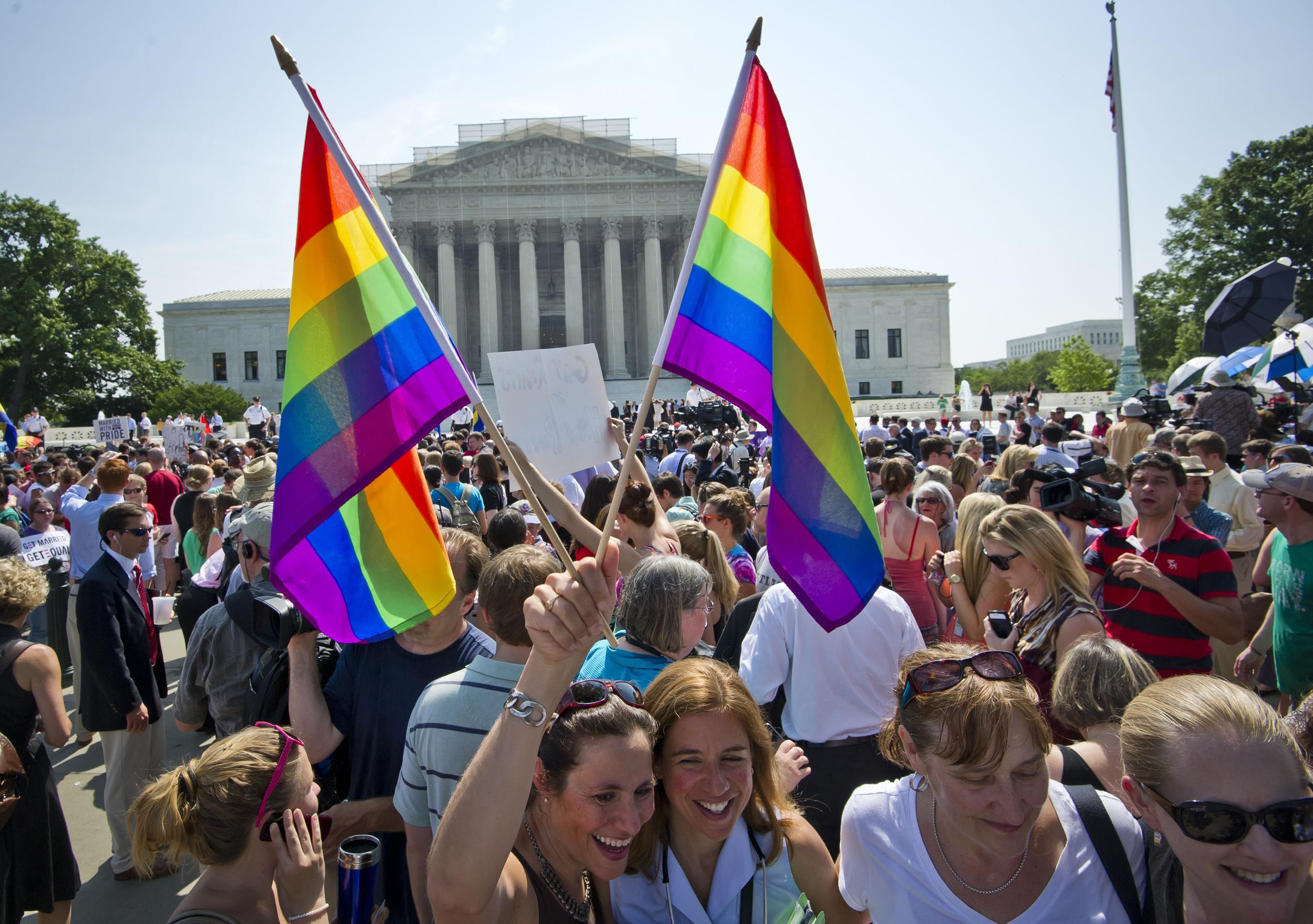The Supreme Court of the United States agreed to hear cases this June resulting from the 6th District Court’s decision to maintain same-sex marriage bans. This decision opposed all other federal courts thus far who have struck down these bans as unconstitutional, thus allowing same-sex couples the right to marry in their states. The court will jointly hear four cases from Tennessee, Michigan, Kentucky, and Ohio, the four states affected by the 6th District’s decision. These Supreme Court cases have the possibility to finally set definitive national legal precedent regarding whether same-sex couples have the constitutional right to marry, thus giving all American citizens, regardless of their sexual orientation, the right to marry in this country.
In deciding the case, the Supreme Court will focus on two separate questions: whether states are required to allow same-sex marriage due to the Equal Protection Clause of the 14th Amendment and if the same clause requires states to recognize same-sex marriages performed legally in other states. Advocates for same-sex marriage will argue that the Equal Protection Clause, which guarantees “the equal protection of the laws” to all citizens, allows all citizens regardless, of sexual orientation, the right to marry.
The most recent case decided by the Supreme Court regarding the legality of same-sex marriage in multiples states was United States v. Windsor (2013), a case that ostensibly declared that referring to marriage as between a man and a woman was unacceptable for federal purposes. In response to this decision, several circuit courts throughout the country issued decisions recognizing same-sex marriage, with the 6th Circuit Court being the only exception. Out of the 37 states that now allow same-sex marriage, 15 are a result of this decision.
United States v. Windsor ruled that the Defense of Marriage Act (DOMA), which allowed states to refuse to recognize same-sex marriages from other states, was unconstitutional. In reading the opinion for United States v. Windsor, Justice Anthony Kennedy, the key swing vote on the court, declared that the language of the Defense of Marriage Act (DOMA) “demeans” the plaintiff, whose “moral and sexual choices the Constitution protects, and whose relationship the State has sought to dignify.”
In speculating which way the court will decide this coming Spring, much attention has been paid to Justice Kennedy, and his language in United States v Windsor seems to be indicative of which way he will vote on the case. While there are typically four conservative and four liberal justices, Justice Kennedy, while often considered a conservative justice, also has historically been a supporter of gay rights in previous cases, and likely will be the deciding vote in this case.
In bringing these four cases to court, the advocates for marriage equality will likely argue that the 14th Amendment allots every American the equal opportunity to marry the person whom they love. Many speculate that the four liberal justices, Justice Breyer, Justice Sotayamor, Justice Ginsberg and Justice Kegan, will agree with this argument, with Justice Kennedy as the key fifth vote. If this happens, not only would the court set a national precedent for same-sex marriage equality, but would also set a precedent for LGBTQ people to be afforded greater protection under the 14th Amendment in further equal rights cases, such as employment discrimination.
Conversely, if Justice Kennedy decides this June that such a move is too drastic, and sides with the four more conservative justices, the exact future of the states currently upholding same-sex marriage bans is unclear, as there will be a major disagreement between national circuit courts. This scenario does not seem as likely, however. With marriage equality now possible in five of the six circuit courts affected by United States v. Windsor and the general population for the first time in our nation’s history largely in support of marriage equality, the tides regarding same-sex marriage seem to have finally shifted.
As Matt Ford for the Atlantic writes, “with the near-unanimous embrace of marriage equality by the lower courts and the social trajectory of gay rights in recent years, a Supreme Court ruling against marriage equality would likely last only as long as its authors.” While the probability of a decision for marriage equality seems likely, the Supreme Court is anything if not unpredictable. A less emphatic decision in support of marriage equality is also a possibility, with Chief Justice Roberts perhaps siding with same-sex marriage as he did with the case regarding Prop 9, but severely lessening its scope. Regardless of the decision reached by the nation’s highest court this June, one thing is certain: the verdict will not inherently ensure universal equality for LGBTQ people.
LGBTQ people are still not nationally protected from employment discrimination, and the bill that would protect them from such discrimination has been pending in Congress for years. There are twelve states which still prohibit gay couples or step-parents from adopting children, and a new bill pending in the Virginia Legislature would allow any business to deny service to LGBTQ people due to “moral” or “religious” convictions. While a decision by the Supreme Court in support of same-sex marriage would be a victory for LGBTQ advocates, the day where LGBTQ people are granted all the same rights as heterosexual people under the law seems for now to be in the distant future.
Get real time updates directly on you device, subscribe now.
Prev Post



